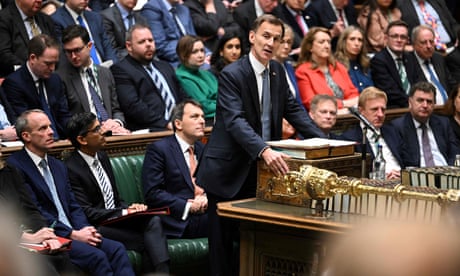Jeremy Hunt is under pressure to be generous when he delivers his first budget speech since he became chancellor last October. The public finances have improved dramatically from the chaotic days that followed Liz Truss’s mini-budget in September, which rocked international money markets and sent interest rates on government debt soaring. The cost of financing Britain’s debt has fallen in recent months and the cost of gas on wholesale markets has tumbled.
As much as £30bn could be available to spend over the next five years and still leave the chancellor within his main fiscal rule, which is to bring down the proportion of debt to annual income – the debt-to-GDP ratio – by 2027. Figures from the Office for National Statistics in January showed that the UK’s total debt last September was £2. 22tn and the debt-to-GDP ratio was 100.
2%. Business and consumer groups want a short-term extension of support for energy bills, to cover the period before the fall in wholesale prices starts to feed through. They also want the chancellor to ease planned increases in tax , and especially corporation tax, which they say will limit investment.
Public sector workers have demanded a pay rise above the 3. 5% Hunt has budgeted for, and households more generally will want an extension of the energy price guarantee at its current level until July, especially now that it will cost the government less than £3bn . Hunt is expected to offer some giveaways, including cash for childcare schemes, and a cut in pension tax for the better-off has also been signalled, which pension experts describe as a clumsy effort to prevent GPs and surgeons nearing retirement from quitting the health service.
However, the chancellor’s spending power will depend on fresh forecasts by the Office for Budget Responsibility (OBR), the Treasury’s independent forecaster. The OBR could make an assessment of the economy that is gloomier than its last, indicating a reduction in tax receipts over the next five years. Many economists expect it to say that this year looks like being better than it had expected, but that subsequent years will be worse.
That could leave the income side of the ledger largely the same. The outgoings might also be the same once the extra spending is offset against the lower than expected interest and energy bills. A neutral budget would preserve much of the chancellor’s war chest until next year, when he will want to splash out on election-winning projects and schemes, not least personal tax cuts that reverse the financial hit from this year’s rising income tax thresholds.
The National Institute of Economic and Social Research says the Treasury needs to ignore the political cycle and prioritise the long-term health of the economy. Adrian Pabst, its deputy director, says the Treasury has become fixated on the level of debt to the exclusion of all other measures of economic health, and especially the prospects for growth. skip past newsletter promotion Sign up to Business Today Free daily newsletter Get set for the working day – we’ll point you to all the business news and analysis you need every morning Privacy Notice: Newsletters may contain info about charities, online ads, and content funded by outside parties.
For more information see our Privacy Policy . We use Google reCaptcha to protect our website and the Google Privacy Policy and Terms of Service apply. after newsletter promotion “It’s in the interests of the country to get on and push ahead now with higher levels of public investment and extra spending on health and social care, not waiting until it suits the electoral cycle,” he says.
“If the chancellor delays, he will only have lower growth in the future to contend with. ” Labour shares this fear. Rachel Reeves , the shadow chancellor, wants to see higher levels of public investment to speed up green infrastructure projects, arguing that they will lift the long-term growth forecasts and alleviate the pressure on Britain’s public finances.
Pabst’s colleague, the economist Stephen Millard, says a change of mindset in the Treasury is needed to achieve this aim. “We have long argued that there is a need for a new framework that recognises the fundamental goal of fiscal policy to improve the welfare of UK households by dealing with market imperfections, redistributing from richer to poorer households, and encouraging productivity growth across the whole of the United Kingdom via well-targeted investment in public infrastructure, without setting borrowing off on an unsustainable path. “Debt and deficit targets are useful ways of helping convince the markets that it is safe to lend to the government, but fiscal policy should not be set purely on the basis of satisfying such targets, which are, essentially, arbitrary.
”.
From: theguardian
URL: https://www.theguardian.com/uk-news/2023/mar/12/hunt-likely-to-save-spending-spree-for-polling-day-not-budget-speech



